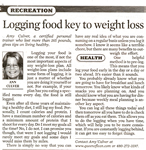 Logging food key to weight loss Logging food key to weight loss
Logging your food is one of the most, if not the most important aspects of any weight-loss plan. All weight-loss plans include some form of logging, it is just a matter of whether you are doing it yourself or not. For example, if your plan has you eating a specified menu every day, the food is still logged. Someone else is just doing it for you.
Even after all these years of maintaining a healthy diet, I still log my food. Personally, I count calories and protein. I have a maximum number of calories and a minimum amount of protein that I shoot for every day. Do I meet my goals all the time? No, I do not. I can promise you though, that were I not logging, I would rarely meet my goals and some days I would miss them by miles.
There is simply no way that you can have any real idea of what you are consuming on a regular basis unless you log it somehow. I know it seems like a terrible chore, but there are many benefits to outweigh the effort.
One helpful method is to pre-log. This means that you actually log your food early in the day or even a day or two ahead. It's easier than it sounds.
You probably already know what you are going to have for breakfast and lunch tomorrow. You likely know what kinds of snacks you are planning on. And you should know what you are having for dinner because weekly meal planning is another key aspect.
You can log all these things down today and then tomorrow all you have to do is check them off as you eat them. This allows you to do the logging when you have time, which will help you to be more consistent. If you are constantly logging behind, it can get too easy to forget things.
Logging helps you see what kind of wiggle room you have. As I mentioned before, I count calories and protein. When I look at what I've had (or am planning to have) for the day and I have met my goals, sometimes there are still some calories available. If I'm hungry or desiring a small treat, I know I can fit it in, guilt-free.
When you have your food planned for the day, you can save the best for last. If you have planned a bit of a treat for yourself, you can save it for later in the evening. That way, you can look forward to it during the day. This can help you to get over the hump of a craving. Then later, you can have your treat at a pre-planned time when you can enjoy it.
There's a commonly used business quote that is just as true with weight loss: “If you fail to plan, you plan to fail.” Take a little time this week, and plan to succeed.
|

